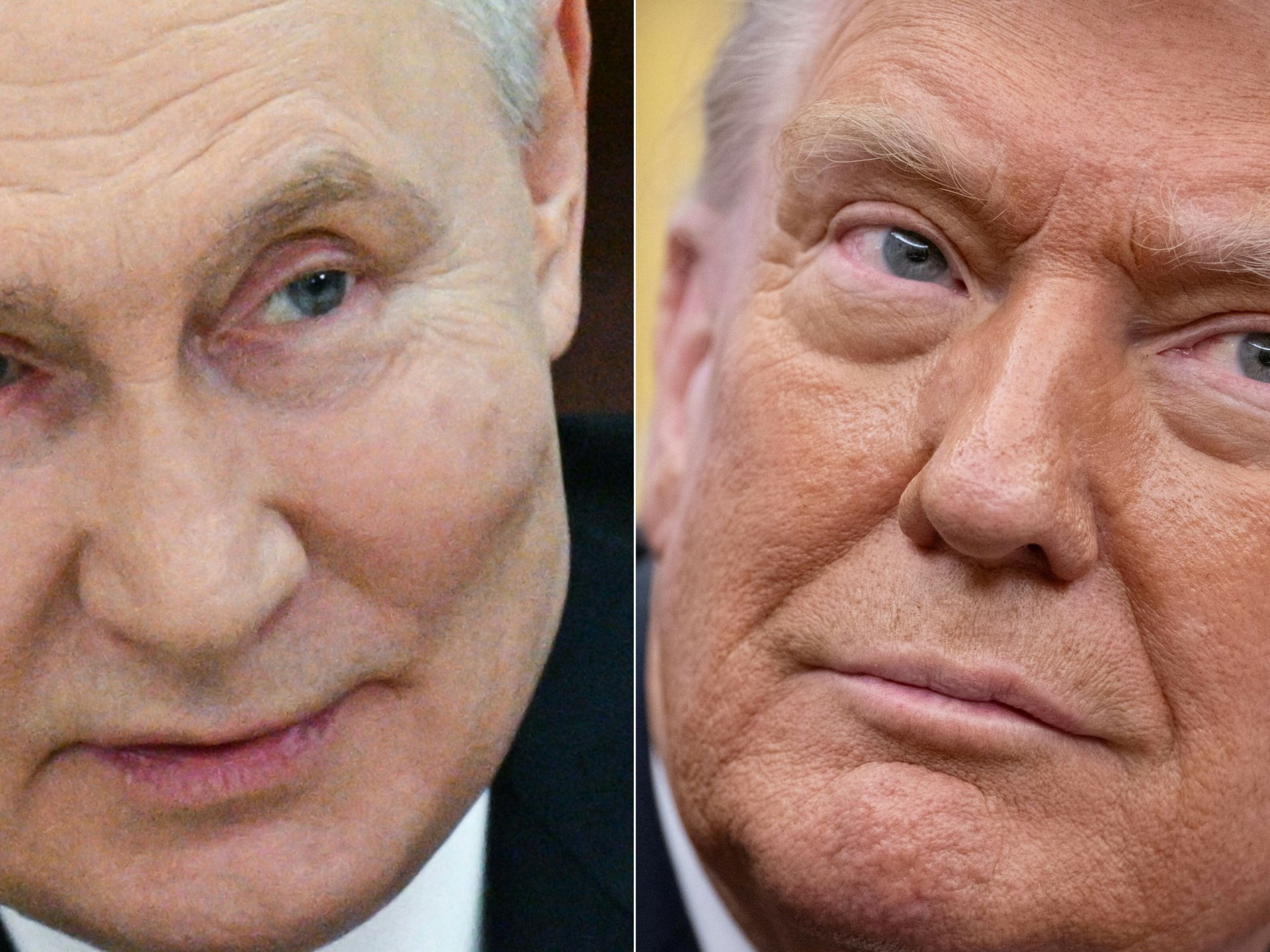Ukraine Should Talk To Putin: Trump's Call For Unconditional Negotiations

Table of Contents
The Arguments for Unconditional Negotiations
Advocates for unconditional negotiations between Ukraine and Russia emphasize several key points.
Potential for Reduced Casualties
The ongoing conflict has inflicted immense suffering. According to UN figures, civilian casualties are tragically high, and the humanitarian crisis deepens daily.
- Over 10,000 civilian deaths (a conservative estimate, the true number is likely much higher).
- Millions displaced from their homes, facing immense hardship and uncertainty.
- Widespread destruction of infrastructure, impacting essential services and civilian life.
Continuing the fighting risks further escalation, potentially leading to even greater loss of life and wider regional instability. Unconditional talks, even without immediate breakthroughs, could provide an avenue to at least minimize further bloodshed. The need for immediate humanitarian relief efforts is paramount, and negotiations could create space for increased aid access.
Exploring a Path to De-escalation
Even without preconditions, negotiations can create a vital opening for dialogue and compromise. A commitment to talking, regardless of initial stances, can establish a framework for future discussions.
- Past successes: The Oslo Accords, while ultimately imperfect, demonstrate the potential for progress, even from seemingly intractable conflicts.
- Building trust: The mere act of engaging in dialogue can foster a degree of trust, crucial for building towards a lasting peace.
- Defining parameters: Initial talks can be used to define parameters for future negotiations, agreeing on formats, agendas, and potential mediators.
While immediate success may not be guaranteed, a commitment to negotiation represents a critical first step towards de-escalation.
Addressing Trump's Rationale
Trump's call for unconditional talks, though controversial, stems from his belief that ending the conflict quickly is paramount, even if it means concessions. He argues that prolonged fighting benefits no one.
- Prioritizing peace: Trump's statements consistently highlight the urgency of ending the bloodshed.
- Avoiding escalation: He emphasizes the risks of further escalation, potentially involving NATO countries.
- Potential political motivations: Critics argue his position might be influenced by domestic political considerations and his relationship with Putin.
Understanding his perspective is important, even while acknowledging potential flaws in his argument.
The Counterarguments Against Unconditional Negotiations
Opponents of unconditional negotiations raise valid concerns regarding Russia's potential exploitation of such a situation.
Concerns about Russian Aggression
Unconditional negotiations risk rewarding Russia's blatant aggression and emboldening further expansionist actions. Russia's annexation of Crimea and its support for separatists in eastern Ukraine serve as stark reminders of its willingness to violate international norms.
- Violation of international law: Russia's invasion of Ukraine is a clear breach of international law and undermines the global order.
- Pattern of aggression: Russia’s history of aggression in Georgia, Chechnya, and other regions shows a pattern of using force to achieve political goals.
- Setting a dangerous precedent: Unconditional surrender might encourage other authoritarian regimes to engage in similar acts of aggression.
Failing to address Russia's aggression could set a dangerous precedent, undermining international security and emboldening further acts of aggression.
Ukraine's Right to Self-Determination
Ukraine has an inalienable right to self-determination, free from external coercion and territorial concessions. The Ukrainian people have the right to decide their own future, and any peace agreement must respect their sovereignty.
- International support: The international community overwhelmingly supports Ukraine's sovereignty and territorial integrity.
- Ukrainian public opinion: Significant opposition exists within Ukraine to any negotiations that involve territorial concessions.
- Principle of self-determination: This is a cornerstone of international law, guaranteeing the right of peoples to freely determine their political status.
The Risk of a "Bad Deal"
Unconditional negotiations risk leading to a deeply unfair peace agreement, in which Ukraine would be pressured to make unacceptable concessions. Russia might exploit this situation to extract significant territorial gains or other political advantages.
- Potential territorial concessions: Ukraine could be forced to cede land or accept a less favorable status within international organizations.
- Economic concessions: Russia might demand significant economic concessions as a condition for peace.
- Weakening Ukraine's sovereignty: A poorly negotiated agreement could significantly weaken Ukraine's long-term stability and security.
Finding a Middle Ground: Conditional Negotiations as a Compromise
A balanced approach involves conditional negotiations, which address the concerns of both sides.
Defining Realistic Preconditions
Prior to any talks, clear preconditions must be defined to ensure a fair and equitable outcome. These preconditions must protect Ukraine's interests while creating a pathway for peace.
- Cessation of hostilities: A complete and verifiable ceasefire is crucial before meaningful negotiations can begin.
- Withdrawal of Russian troops: Russia must withdraw its forces from all Ukrainian territory occupied since February 2022.
- Respect for territorial integrity: Any agreement must fully uphold Ukraine's territorial integrity within its internationally recognized borders.
- Accountability for war crimes: Mechanisms for investigating and prosecuting war crimes must be established.
International Involvement and Mediation
International actors such as the UN, NATO, and the EU, have a crucial role to play in mediating these talks and ensuring a fair outcome.
- Impartial mediation: These organizations can provide an impartial platform for negotiations and help guarantee the process's fairness.
- Monitoring mechanisms: International monitors can help enforce any agreements reached and ensure compliance by both sides.
- Security guarantees: International actors can help provide security guarantees for Ukraine to deter future aggression.
The Debate Over Ukraine Should Talk to Putin: A Path Forward
The decision of whether or not Ukraine should engage in talks with Putin is incredibly complex. Unconditional negotiations risk rewarding aggression and leaving Ukraine vulnerable to exploitation. However, prolonged conflict continues to cause immense human suffering. Finding a middle ground through carefully defined conditional negotiations, mediated by international actors and prioritizing Ukraine's sovereignty and territorial integrity, offers the best path towards a sustainable and just peace. We must encourage further discussion and research on this critical issue, ensuring informed opinions on navigating the complexities of Ukraine-Russia negotiations and finding a peaceful resolution in Ukraine. Only through reasoned debate and a commitment to diplomacy can we hope to achieve a just and lasting peace.

Featured Posts
-
 Valentina Shevchenkos Dragon Themed Fighting Gear Design Details
May 12, 2025
Valentina Shevchenkos Dragon Themed Fighting Gear Design Details
May 12, 2025 -
 Injury Concerns Yankees Vs Brewers Series Preview March 27 30
May 12, 2025
Injury Concerns Yankees Vs Brewers Series Preview March 27 30
May 12, 2025 -
 Milwaukee Fire Disaster Four Fatalities Hundreds Displaced
May 12, 2025
Milwaukee Fire Disaster Four Fatalities Hundreds Displaced
May 12, 2025 -
 Aaron Judges On Field Push Ups A 2025 Goal Revealed
May 12, 2025
Aaron Judges On Field Push Ups A 2025 Goal Revealed
May 12, 2025 -
 Understanding Adam Sandlers Oscars 2025 Appearance Outfit Joke And Chalamet Hug
May 12, 2025
Understanding Adam Sandlers Oscars 2025 Appearance Outfit Joke And Chalamet Hug
May 12, 2025
Latest Posts
-
 Cubs Game 16 2025 Who Were The Stars And The Strugglers
May 13, 2025
Cubs Game 16 2025 Who Were The Stars And The Strugglers
May 13, 2025 -
 Game 16 2025 A Deep Dive Into Cubs Wins And Losses
May 13, 2025
Game 16 2025 A Deep Dive Into Cubs Wins And Losses
May 13, 2025 -
 Mlb 2 1 6
May 13, 2025
Mlb 2 1 6
May 13, 2025 -
 Analyzing The 2025 Cubs Performance In Game 16
May 13, 2025
Analyzing The 2025 Cubs Performance In Game 16
May 13, 2025 -
 2025 Chicago Cubs Deconstructing Game 16s Successes And Failures
May 13, 2025
2025 Chicago Cubs Deconstructing Game 16s Successes And Failures
May 13, 2025
